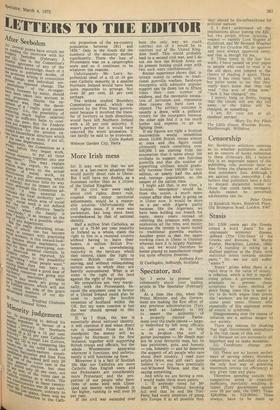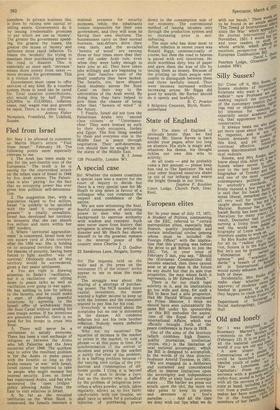Stasis
Sir: 2,500 years ago the Greeks coined a word 'stasis' for an unpleasant economic disease, defined (The City-State of the Greeks and Romans, W. Warde Fowler, Macmillan, London, 1966) as "A standing or taking up a distinct position in the State, with malicious intent towards another party." Do we not still suffer ' stasis '?
Stasis ' arises when there is a rapid drop in the value of money, ie inflation, which is felt in rapidly rising prices. A government then attempts to prevent these symptoms by some method of price fixing; since this is easier to try to do with wages than prices the workers ' are hit most, and at some point resist. History tells repeatedly of this unplesant series of events or syndrome.
Disagreements over the causes of inflation are a serious danger to our society.
There are reasons for thinking that high Government expenditure is the real cause of this evil: (i) Because we are necessarily all imperfect and so make mistakes; (ii) Conditions change continuously;
(iii) There are no known perfect ways of serving others; therefore competition or individual choice is the only best way of achieving maximum service (or efficiency) at any given time and place.
Therefore spending outside the competitive arena is relatively inefficient, inevitably resulting in losses (Tory government spends over 53 per cent, the GNP). These £24,000m to £12,000m). These always, have to be made up somehow. In private business this is done by raising new capital or selling assets. Governments do it by issuing irredeemable promises to pay which we use as 'money'. The greater the government spending, the greater the losses, the greater the issues of 'money' and serhence more rapid inflation. To blame the 'workers' for trying to maintain their purchasing power is the road to disaster. This is especially so since each 'increase' means more money from taxes — more revenue for government. This is a vicious circle.
Government must cease to offer services of any kind. By a voucher system those in need can be cared for. Total taxation (contributions, etc) would drop by half. (From £24,000m to E12,000m), inflation cease, real wages rise and growth be rapid. There is no other way. Antony Fisher Newplace, Framfield, Nr Uckfield, Sussex.











































 Previous page
Previous page